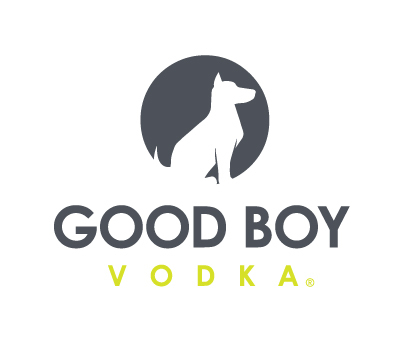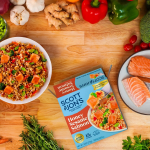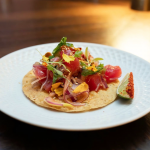Multicultural Consumers “More Willing” To Embrace Plant-Based Alternatives, Danone Study Finds
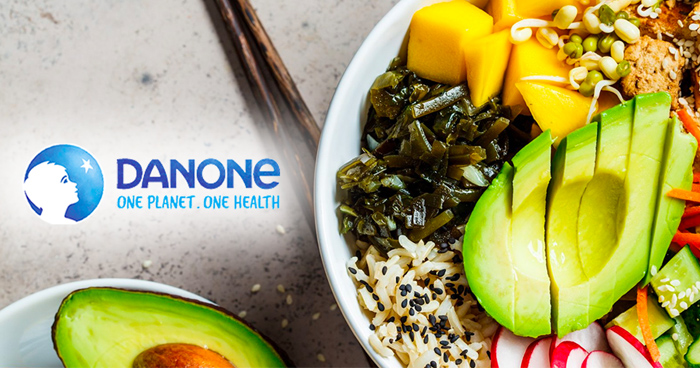
Plant-based diets are on the rise among multicultural consumers, according to a new study published last week by Danone North America. In a survey of over 4,000 respondents including Asian Americans, Black/African Americans and Hispanic/Latinos adults in the U.S., over 60% say they are open to trying plant-based foods. However, results suggest there is a gap in the market caused by a lack of culturally diverse plant-based food innovation, cultural stigmas and barriers to access including product affordability and education.
Opportunities For Innovation
According to the survey, 71% of Asian Americans, 55% of Black/African Americans and 61% of Hispanic/Latino respondents said they are willing to try plant-based alternatives. In comparison, 49% of the survey’s total population reported a willingness to substitute plant-based foods into their diet.
Additionally, 79% of survey respondents said they believe food is a form of self-expression. However, when asked if their communities and cultures are represented by plant-based food companies and brands, 58% of Hispanic/Latino, 52% of Asian Americans and 60% of African American/Black respondents answered “not that well” or “not at all.” Over half of the respondents also noted the existence of additional barriers including cultural stigmas around people who eat plant-based food and lack of accessibility to these foods due to higher cost and lack of education about the products.
“Plant-based eating has the potential to be a real beacon of healthy living, especially for diverse communities,” said John Starkey, President of Plant-Based Food & Beverage for Danone North America, in a press release. “We’ve made a conscious effort to be more inclusive and reach underrepresented communities… Yet, there is still a lot of work to be done in understanding how different communities are experiencing plant-based food and beverages and how we can do more to engage and appeal to multicultural consumers, from our innovation choices and marketing efforts to our community impact work and sustainability strategies.”
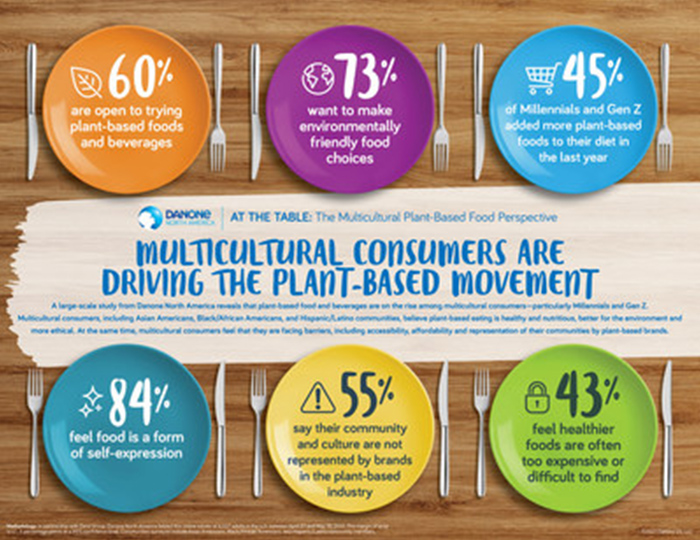
Engaging The New Consumer
Gen Z and younger millennial consumers are driving the growth of plant-based alternatives, according to the survey, which found these younger consumers are more likely to follow a vegetarian or flexitarian diet. According to the Good Food Institute, 34% of millennials eat plant-based dinners at least four times a week and interest in plant-based food among younger, multicultural generations has been steadily increasing in recent years.
Considering these findings, coupled with Gen Z’s designation as the most racially and ethnically diverse generation yet, it’s unlikely the upward trend toward plant-based diets will fall flat anytime soon.
As plant-based diets become mainstream, the industry will be urged to rethink how they engage with new consumers. According to the Plant Based Food Association (PBFA), Caucasians (71%) and non-Hispanic (85%) consumers are currently the primary group driving sales. Sales data from the PBFA also reflects a fairly significant gap in terms of income and education levels among plant-based consumers: last year 60% of sales came from households with a college degree or higher and 54% of sales from households with a yearly income of $70,000 and up.
“Marketing efforts for our portfolio should reflect the diversity of our consumers and society—and also reach those consumers meaningfully,” said Terrance Irizarry, Head of Inclusive Diversity for Danone North America. “Conducting this important research on behalf of our plant-based portfolio is a huge step forward in listening, learning and ultimately taking action. It’s also part of our larger journey and work toward enhancing the overall diversity in our content and our partnerships with diverse suppliers in the industry.”
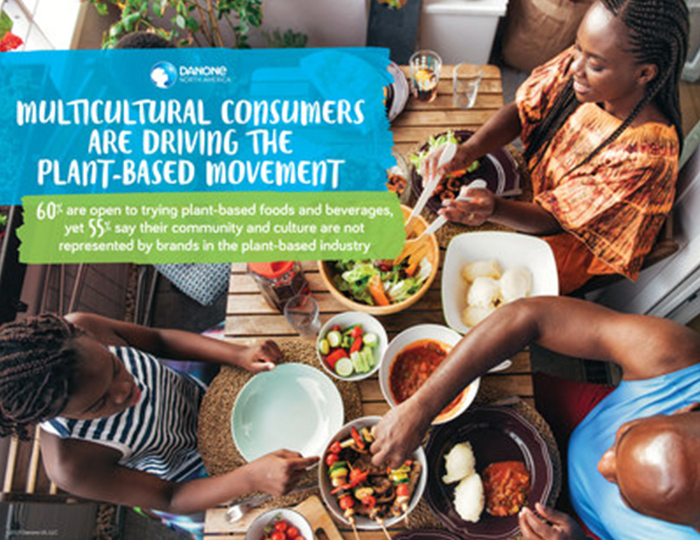
What does this mean?
The report drew significant attention to the lack of multicultural representation within marketing efforts and new innovations of plant-based alternatives, noting significant whitespace in terms of culturally-focused foods in the industry in addition to an increased consumer interest in animal-free alternatives.
Despite the recent slowdown in plant-based meat sales during Q3, the overall category is still trending upward, according to IRI data for the period ending September 26, 2021, increasing 74% compared to the same period in 2019 with meat and milk alternatives leading the industry in terms of dollar sales.
Brands like OmniFoods have highlighted the culturally diverse use occasions for its Asian-inspired, plant-based meat alternatives on front-of-pack, ranging from spring rolls and dumplings to tacos and meatballs. However, the majority of plant-based alternatives are positioned to highlight the product’s sustainability credentials.
Black-owned, plant-based food brand Something Better Foods was founded to directly address this oversight with a mission to “democratize access” to plant-based food for all people. The California-based company sells plant-based “popular comfort and ethnic foods” under the name Better Chew including southern-style fried fish and smokehouse beefy ribs. Founder and CEO of Something Better Foods, GW Chew, also serves on the board of the Plant Based Food Association and highlighted this cultural gap in the market earlier this year, citing a study that found people of color are three times more likely to eat less meat than white people.
Although the company emphasizes the higher rate of diet-related illnesses within black communities as a key reason it was founded, it also notes the lack of flavor and familiarity within existing plant-based alternatives and the positive environmental impacts of eating plant-based foods as key components to its mission and future innovations.








